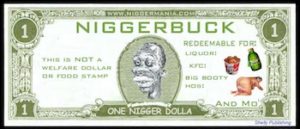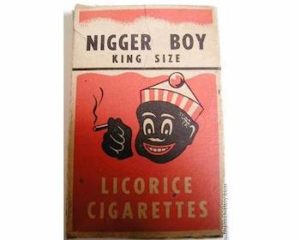
On this date, we look at the history of the word “nigger” in America, a word that still sits at the center of anti-Black verbal distortions.
*Note: some of the content in this writing may be offensive to children.
The history of the word nigger is often traced to the Latin word niger, meaning Black. This word became the noun Negro (Black person) in English and simply the color Black in Spanish and Portuguese. In early modern French, niger became negre and, later, negress (Black woman) was unmistakably a part of language history. One can compare to negre the derogatory nigger and earlier English substitutes such as negar, neegar, neger, and niggor that developed into its lexico-semantic true version in English. It is probable that nigger is a phonetic spelling of the White Southern mispronunciation of Negro.
No matter its origins, by the early 1800s, it was firmly established as a derogative name. In the 21st century, it remains a principal term of White racism, regardless of who uses it. Social scientists agree that words like nigger, kike, spic, and wetback come from three categories: disparaging nicknames (chink, dago, nigger); explicit group devaluations ("Jew him down" or "niggering the land"); and irrelevant ethnic names used as a mild disparagement ("jew bird" for cuckoos having prominent beaks or "Irish confetti" for bricks thrown in a fight.)
Over time, racial slurs have victimized all racial and ethnic groups. Still, no American group has endured as many racial nicknames as Blacks: coon, tom, savage, pickaninny, mammy, buck, samba, jigaboo, and buckwheat are some. Many of these slurs became fully traditional pseudo-scientific, literary, cinematic, and everyday distortions of African Americans. These caricatures, whether spoken, written, or reproduced in media and material objects, reflect the extent, the vast network, of anti-Black prejudice.
The word, nigger, carries much hatred and disgust directed toward Black Africans and African Americans. Historically, nigger defined, limited, made fun of, and ridiculed all Blacks. It was a term of exclusion, a verbal reason for discrimination. Whether used as a noun, verb, or adjective, it strengthened the stereotype of the lazy, stupid, dirty, worthless nobody. No other American surname carries as much purposeful cruelty. The following shortlist is important information on the word's use and meaning:
Naggers: Acting lazily and irresponsibly.
Niggerlipping: wetting the end of a cigarette while smoking it.
Niggerlover: Derogatory term aimed at Whites lacking in the necessary loathing of Blacks.
Nigger luck: Exceptionally, but undeserved good luck.
Nigger-flicker: A small knife or razor with one side heavily taped to preserve the user's fingers.
Nigger heaven: Designated places, usually the balcony, where Blacks were forced to sit, for example, in an integrated movie theater or church.
Nigger knocker: Axe handle or weapon made from an ax handle.
Nigger rich: Deeply in debt but flamboyant.
Nigger shooter: A slingshot.
Nigger steak: A slice of liver or a cheap piece of meat.
Nigger stick: Police officer's baton.
Nigger tip: Leaving a small tip or no tip in a restaurant.
Nigger in the woodpile: A concealed motive or unknown factor affecting a situation adversely.
Nigger work: Demeaning, menial tasks.
Nigger (as a word) is also used to describe a dark shade of color (nigger-brown, nigger-Black), the status of Whites that mix with Blacks (nigger-breaker, dealer, driver, killer, stealer, worshipper, and looking), and anything belonging to or linked to African Americans (nigger-baby, boy, girl, mouth, feet, preacher, job, love, culture, college, music, etc.). Nigger is the ultimate American insult; it is used to offend other ethnic groups. Jews are called White-niggers; Arabs, sand-niggers; Japanese, yellow-niggers. Americans created a racial hierarchy with whites at the top and Blacks at the bottom.
In biology, heredity refers to the transference of biological characteristics from a parent organism to offspring. The word, nigger, speaks to the human heredity of Black people. Defining which characteristics of a person are due to heredity and which are due to environmental influences is often a controversial discussion (the nature versus nurture debate), especially regarding intelligence and race.
The hierarchy was set up by an ideology that justified deceit, exploitation, and intimidation to keep Blacks "in their place." Every major societal establishment offered legitimacy to the racial hierarchy. Ministers preached that God was White and had condemned Blacks to be servants. Scientists measured Black skulls, brains, faces, and genitalia, seeking to prove that Whites were genetically superior to Blacks. White teachers, teaching only White students, taught that Blacks were less evolved cognitively, psychologically, and socially. The entertainment media, from vaudeville to television and film, portrayed Blacks as docile servants, happy-go-lucky idiots, and dangerous thugs, and they still do this today. The criminal justice system sanctioned a double standard of justice, including its unspoken approval of mob violence against Blacks, and there is still a similar double standard today. Anti-Black laws and images saturated both American slavery and the Jim Crow laws which followed. The negative portrayals of Blacks were reflected in and shaped by everyday objects: toys, postcards, ashtrays, detergent boxes, fishing lures, and children’s books. These items, and countless others, portrayed Blacks with bulging, darting eyes, fire-red oversized lips, jet-Black skin, and either naked or poorly clothed.
In 1874, the McLoughlin Brothers of New York produced a puzzle game called "Chopped Up Niggers." Beginning in 1878, the B. Leidersdory Company of Milwaukee, WI., produced NiggerHair Smoking Tobacco. Decades later, the name was changed to BiggerHair Smoking Tobacco. A 1916 magazine ad, copyrighted by Morris & Bendien, showed a Black child drinking ink. The caption read, "Nigger Milk" (shown). In 1917, the American Tobacco Company had a NiggerHair redemption promotion. NiggerHair coupons were redeemable for "cash, tobacco, S&H Green stamps, or presents." The J. Millhoff Company of England produced a series of cards in the 1930s widely distributed in the United States. One of the cards shows ten small Black dogs with the caption: "Ten Little Nigger Boys Went Out To Dine."
This is the first line from a popular children's story called "The Ten Little Niggers." it reads like this.
Ten Little Nigger Boys went out to dine;
One choked his little self, and then there were nine.
Nine Little Nigger Boys sat up very late; One overslept, and then there were eight. Eight Little Nigger Boys traveling in Devon; One said he'd stay there, and then there were seven.
Seven Little Nigger Boys chopping up sticks; One chopped himself in halves, and then there were six.
Six Little Nigger Boys playing with a hive; a Bumblebee stung one, and then there were five.
Five Little Nigger Boys going in for Law; one got in Chancery, and then there were four.
Four Little Nigger Boys going out to Sea; A Red Herring swallowed one, and then there were three.
Three Little Nigger Boys walking in the Zoo; the big Bear hugged one, and then there were two;
Two Little Nigger Boys sitting in the Sun; One got frizzled up, and then there was one.
One Little Nigger Boy living all alone; He got married, and then there were none.

In 1939, writer Agatha Christie published a book called Ten Little Niggers. Later editions sometimes changed the name to Ten Little Indians or And Then There Were None, but as late as 1978, copies of the book with the original title were being produced. It was not rare for sheet music produced in the first half of the 20th century to use the word nigger on the cover. The Howley, Haviland Company of New York produced sheet music for the songs "Hesitate Mr. Nigger, Hesitate," and "You'se Just A Little Nigger, Still You'se Mine, All Mine." This last example was promoted as a children's lullaby. Some small towns used nigger names, for example, Nigger Run Fork, Virginia. Nigger was a common name for darkly colored pets, especially dogs, cats, and horses. So-called "Jolly Nigger Banks," first made in the 1800s, were widely distributed as late as the 1960s. Another common piece with many variations, produced on posters, postcards, and prints, is a picture of a dozen Black children rushing for a swimming hole. The caption reads, "Last One In's A Nigger."
The civil rights movement, Supreme Court decisions, the Black empowerment movement, broad civil rights legislation, and a general embracing of democracy by many American citizens have worn down America’s racial pecking order from slavery, moving into the Jim Crow period and today’s institutional racism. Yet, the word nigger has not left, and its relationship with anti-Black prejudice remains symbiotic, interrelated, and interconnected. Ironically, it is co-dependent because a racist society created nigger and continues to feed and sustain it. But, the word no longer needs racism, or brutal and obvious forms, to survive. The word nigger today has its existence.
Another interesting and confusing experience in American speech is the use of nigger by African Americans. Poetry by Blacks is instructive; one can often find the word nigger used in Black writings. Major and minor poets alike have used it with startling results: Imamu Amiri Baraka, the contemporary poet, uses nigger in one of his angriest poems, "I Don't Love You," and what was the world to the words of slick nigger fathers too depressed to explain why they could not appear to be men. One wonders how readers are supposed to understand "nigger fathers.” Baraka's use of this imagery, regardless of his purpose, reinforces the stereotype of the worthless, pleasure-seeking “coon” caricature. Ted Joans's use of nigger in "The Nice Colored Man" is an example of an explainable expression. Joans said he was asked to give a reading in London because he was a "nice colored man." Infuriated by the labels "nice" and "colored,” Joans wrote a quintessential rebellious poem. While the poem should be read in its entirety, a few lines will do:
Smart Black Nigger Smart Black Nigger Smart Black Nigger Smart Black Nigger Knife-Carrying Nigger Gun-Toting Nigger Military Nigger Clock Watching Nigger Poisoning Nigger Disgusting Nigger Black Ass Nigger.
This piece uses adjective upon adjective attached to the word nigger.
The reality is that many of these uses can be heard in present-day African American society. Herein lies part of the difficulty: The word, nigger, endures because it is used over and over again, even by the people it insults. Writer Devorah Major said, "It's hard for me to say what someone can or can't say because I work with language all the time, and I don't want to be limited." Poet and professor Opal Palmer Adisa claims that the use of nigger or nigga is "the same as young people's obsession with swearing. Much of their use of such language is an internalization of negativity about themselves." Rappers, themselves poets, rap about niggers before mostly White audiences, some of whom see themselves as wiggers (White niggers) and refer to one another as "my niggah." Snoop Doggy Dogg’s single, "You Thought," raps, "Wanna grab a skinny nigga like Snoop Dogg/Cause you like it tall/and work it baby doll." Tupac Shakur’s "Crooked Ass Nigga" lyrics included, "Now I could be a crooked nigga too/When I'm rollin' with my crew." Also, rap lyrics that degrade women and glamorize violence reinforce the historical Brute Caricature.
Erdman Palmore researched lexicons and said that the number of offensive words correlates positively with the amount of out-group prejudice, and these express and support negative stereotypes about the most visible racial and cultural differences. When used by Blacks, nigger refers to, among other things, all Blacks ("A nigger can't even get a break."); Black men ("Sisters want niggers to work all day long."); Blacks who behave in a stereotypical, and sometimes legendary, manner ("He's a lazy, good-for-nothing nigger."); things ("This piece-of-shit car is such a nigger."); enemies ("I'm sick and tired of those niggers bothering me!"); and friends ("Me and my niggers are tight."). This final habit, like a kind word, is particularly challenging. "Zup Niggah" has become an almost universal greeting among young urban Blacks. When asked, Blacks who use nigger or its variants argue that it has to be understood in its situation; repeated use of the word by Blacks will make it less offensive. It’s not the same word because Whites are saying nigger (and niggers), but Blacks are saying niggah (and niggaz). Also, it is just a word; Blacks should not be prisoners of the past or the ugly words that originated in the past.
These arguments may not be true in the real world. Brother (Brotha) and Sister (Sistha or Sista) are terms of endearment. Nigger was and still is a word of disrespect. More to the point, the artificial dichotomy between Blacks or African Americans (respectable and middle-class) and niggers (disrespectable and lower class) should be challenged. Black is a nigger, regardless of behavior, earnings, goals, clothing, skills, ethics, or skin color. Finally, if continued use of the word lessened its damage, then nigger would not hurt or cause pain now. Blacks, from slavery until today, have internalized many negative images that White society cultivated and broadcast about Black skin and Black people. This is mirrored in cycles of self-and same-race hatred. The use of the word, nigger by Blacks reflects this hatred, even when the user is unaware of the psychological forces involved. Nigger is the ultimate expression of White racism and White superiority, no matter how it is pronounced. It is linguistic corruption, an attack on civility.
On a smaller scale, words other than Nigger remain accepted public banter in White America. In 1988, on Martin Luther King's birthday, sports commentator Jimmy “The Greek” Snyder said (on national television) that Black people were better at sports because of slave plantation breeding techniques. "During the slave period, the slave owner would breed his Black with his big woman so that he would have a big Black-kid. That's where it all started." Another sports announcer, Billy Packer, referred to the pro-basketball player Allan Iverson as a "tough monkey." Another announcer, Howard Cosell, referred to Alvin Garrett, a pro football player with the Washington Redskins, as a "little monkey" during a Monday Night Football game. The comments made by Cosell and Packer did not go without any punitive consequences.
Nigger is one of the most notorious words in American culture. Some words carry more weight than others. But without trying to exaggerate, is genocide just another word? Pedophilia? Clearly, no, and neither is nigger.
After a period of relative dormancy, the word nigger has been reborn in popular culture. It is hard-edged, and streetwise, and it has crossed over into movies like Pulp Fiction (1994) and Jackie Brown (1997), where it became a symbol of "street authenticity" and hipness. Denzel Washington's character in Training Day (2001) uses nigger frequently and harshly. Richard Pryor long ago rejected the use of the word in his comedy act. Still, Chris Rock, Chris Tucker, and other Black male comedy kings use nigger regularly and not affectionately. Justin Driver, a social critic, makes a case that both Rock and Tucker are modern minstrels shucking, jiving, and grinning in the tradition of Step 'n Fetchit. White supremacists have found the Internet an indispensable tool for spreading their message of hate. An Internet search of nigger using Netscape or Alta Vista locates many anti-Black web pages: Niggers Must Die, Hang A Nigger for America, Nigger Joke Central, and many others. Web searchers find what most Blacks know from personal experience, that nigger is an expression of anti-Black hostility. Without question, nigger is the most commonly used racist slur during hate crimes.
No American minority group has been caricatured as often or in as many ways as Black people. These misrepresentations feature distorted physical descriptions and negative cultural and behavioral stereotypes. The Coon caricature, for example, was a tall, skinny, loose-jointed, dark-skinned male, often bald, with oversized, ruby-red lips. His clothing was either ragged and dirty or extremely gaudy. His slow, exaggerated walk suggested laziness. He was a pauper, lacking ambition and the skills necessary for upward social mobility. He was a buffoon. When frightened, the Coon's eyes bulged and darted. His speech was slurred, halted, and stuffed with malapropisms. His piercing, high-pitched voice made Whites laugh. The Coon caricature dehumanized Blacks and served to justify social, economic, and political discrimination. Nigger may be considered an umbrella term, saying that Blacks have the negative characteristics of the Coon, Buck, Tom, Mammy, Sambo, Pickaninny, and other anti-Black caricatures.
In 2003, the fight to correct the shameful availability of this word had positive results. Recently Kweisi Mfume, president and CEO of the National Association for the Advancement of Colored People (NAACP), gave a speech at Virginia Tech. Everyone was informed that a landmark decision was made with the people at Merriam-Webster Dictionary. Recognizing their error, beginning with the next edition, the word nigger will no longer be synonymous with African Americans in their publication.
Nigger, like the false impressions it incorporates and means, puts down Blacks and rationalizes their abuse. Blacks' use of the word or its alternatives has not lessened its hurt. This is not surprising in a four centuries-old racial hierarchy, shaping the historical relationship between white-European Americans and African Americans. Anti-Black attitudes, motives, values, and behavior continue. Historically, nigger, more than any other word, captures the personal hatred and institutionalized racism directed toward Blacks. In 2013, incidents such as Atlanta-born restaurant entrepreneur Paula Dean and Oklahoma football player Reilly Cooper's comfortable reference to the word show change is still needed. Ongoing verbal against Blacks, such as Bette Midler's 2018 reference to the John Lennon Yoko Ono song, also shows that it is alive in the white vocabulary, and it still does great harm.
In 2022, actor Samuel L. Jackson commented on the Joe Rogan Show (a white man's) use of the word. noting that Rogan was comfortable using it.
Contributing writers:
Phil Middleton and David Pilgrim.
Dr. David Pilgrim, Dept. of Sociology
Ferris State University, 2001
